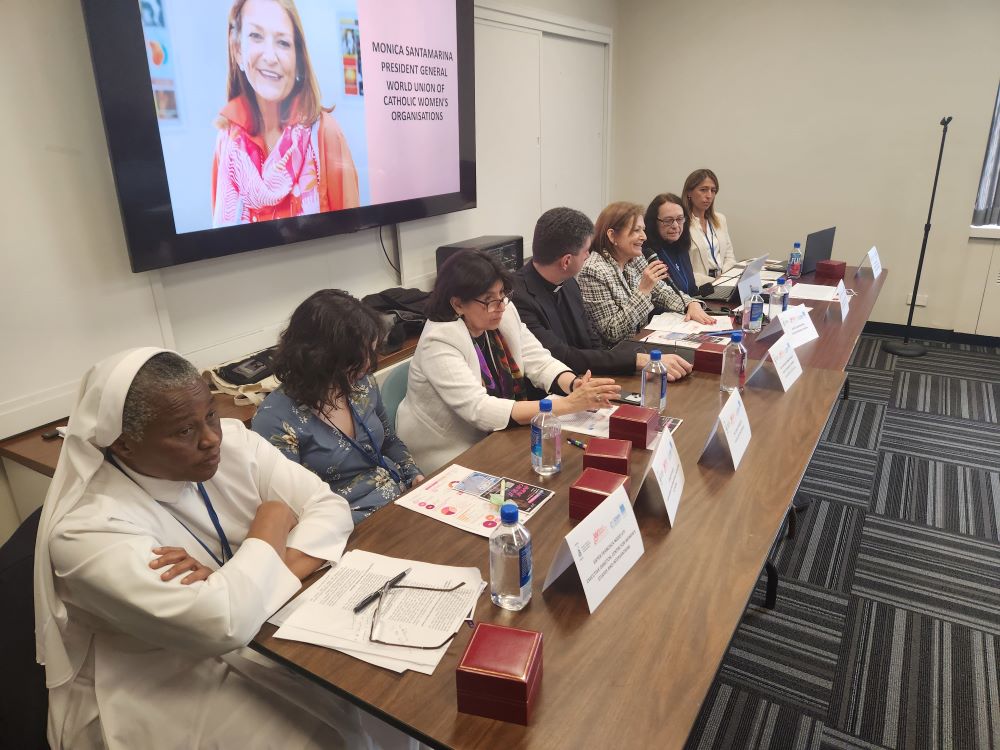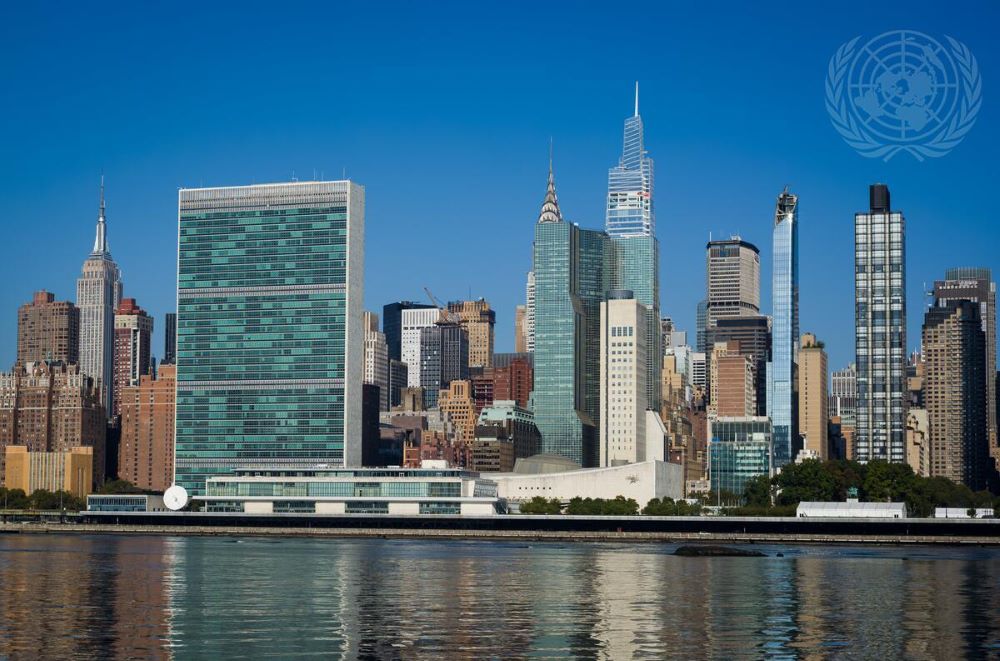
Sr. Ngozi Frances Uti, far left, participates in a Commission on the Status of Women event at the Church Center for the United Nations in March. A member of the Congregation of the Handmaids of the Holy Child Jesus, Uti heads the Centre for Women Studies and Intervention in Abuja, Nigeria, and has been a frequent attendee of U.N. events. (GSR photo/Chris Herlinger)
Editor's note: This is one in a series of stories about Catholic sisters' advocacy at the United Nations.
Call it the boomerang effect.
Those advocating for justice at the grassroots — like Catholic sisters working with migrants, with women and children, with people experiencing economic poverty — can often feel alone in their efforts.
But in appealing to international forums like the United Nations, sisters and others can feel empowered — gaining legitimacy and allies, and feeling that the issues and concerns they raise can "boomerang international support back to press for change at home," said Sr. Ngozi Frances Uti, a member of the Congregation of the Handmaids of the Holy Child Jesus.
Put another way, connecting the local and global is a valuable part of sister advocacy, she said.
"Advocacy at the U.N. is not abstract rhetoric but a concrete tool that enhances local ministry. It provides frameworks, resources and legitimacy that grassroots actors can use to press for change," Uti told Global Sisters Report.
With experience at the grassroots as head of the Centre for Women Studies and Intervention in Abuja, Nigeria, and as a participant in U.N. forums like this year's Commission on the Status of Women, Uti believes "Catholic sisters are especially effective in this model because of their dual embeddedness — deep roots at the grassroots and structured presence at international platforms."
'[We are] sort of like the watch guards of what's really going on because the nation's people sometimes just want to paint a beautiful picture about what's happening.'
—Sr. Durstyne "Dusty" Farnan
Uti offered two examples of what she called "the feedback loop" between local ministries and advocacy at the United Nations.
Sister U.N. advocacy, she said, helped efforts to spotlight a 2015 Nigerian anti-violence law that criminalizes harmful practices like female genital mutilation.
By engaging U.N. human rights mechanisms and highlighting the gaps in enforcing the law in Nigeria, sisters who returned home from participation at the United Nations did so "with renewed leverage to press government agencies, traditional leaders, and local councils to uphold these laws."
For Uti's specific ministry, that meant "working with communities in Cross River State to develop bylaws against early child and forced marriage and female genital mutilation." Those aligned directly, she said, with Nigeria's obligations under the United Nations' 1979 Convention on the Elimination of All Forms of Discrimination against Women, known as CEDAW, and the U.N.'s ambitious sustainable development goals, or SDGs.
Another example, Uti said, lies in the area of economic empowerment. One cause sisters at the U.N. champion involves advocating for women's rights to sustainable livelihoods and decent work.
On the ground, Uti said, this advocacy translates "into practical programs such as training widows and survivors of conflict in skills acquisition, microenterprise and cooperative savings groups." By linking such efforts to global commitments like the SDGs, she said, "we are able to attract partnerships with NGOs, faith-based donors and government agencies who recognize that these small-scale projects are part of a larger global agenda."
"Global advocacy gave legitimacy and urgency to local initiatives," Uti said. Commitments agreed to by U.N.-member states, like Nigeria, give domestic advocates like Catholic sisters "authoritative tools" when pressing and lobbying their governments.
The leaders 'need to hear from us'
That is only part of the connective fiber between the U.N. and local ministries.
At times the sisters — speaking at U.N. forums and conferences — will have to represent those on the ground in the countries where their congregations are working.

The United Nations headquarters building in New York City as seen from across the East River (UN photo/ Manuel Elias)
Daughter of Wisdom Sr. Jean Quinn, who heads the sister-based advocacy group UNANIMA, has invited testimonies from those who have experienced homelessness, and Adrian Dominican Sr. Durstyne "Dusty" Farnan, did that in bringing Indigenous people to the U.N. for forums focused on Indigenous issues.
As Sr. Mary Jane Caspillo, the Medical Mission Sisters representative at the U.N. puts it, "We work alongside people who are directly impacted by multiple crises," such as climate change, extractive industries, war and conflict, and gender-based violence. "They are not merely victims. They hold vital knowledge about what is needed in humanitarian situations."
Our work, she added, is about "offering pathways for how crises can be responded to and resolved."
That also applies to the SDGs, said Farnan, who until recently represented the Dominican Leadership Conference at the global body.
"We have the opportunity to consult with our members wherever they are in the world," she said. That is important because "the men and women who are leading those countries, they need to hear from us. And we also are sort of like the watch guards of what's really going on because the nation's people sometimes just want to paint a beautiful picture about what's happening."
This often happens during the annual High-Level Political Forum, or HLPF, which often serves as a chance for countries to speak of "all the glowing work that they've been doing on five of the SDGs," Farnan said.
"It is true that they've done a lot," but when you "ask the people on the ground, 'How are things for you?' We often find out that things have only improved slightly."
Sr. Ligia Elizabeth Molina Sevilla, a member of the Congregation of Notre Dame from Honduras, has focused on pastoral work for 15 years in the Guatemalan highlands. She was invited by her congregation, in coordination with the Joint Coalition of Religious Organizations for Justice at the U.N., to participate in this year's HLPF, which evaluated progress toward the SDGs in a number of countries, including Guatemala. (The SDGs aim to reduce such social ills as economic poverty by the year 2030, a goal few at the United Nations believe will be achieved.)
In working with other members of Guatemala's civil society in a process called a voluntary national review, Molina Sevilla and others analyzed the Guatemalan government's formal presentation.
While there was some progress in achieving gender equality in Guatemala — in the areas of education, health, protection against violence, women's access to land, and labor inclusion — she said overall "advances have been minimal and slight in reality;" in some sectors, there's been "no progress at all."
A key factor in not achieving the sustainable development goal on gender equality is what Molina Sevilla calls "the persistence of social norms and customs that promote machismo and discrimination against women and restrict women's access to resources and opportunities at all levels."
In reflecting on her experience, she told GSR that it is important that members of civil society, including Catholic sisters, "remain vigilant in ensuring compliance with the SDGs [by 2030], and to this end, civil society must act as a watchdog to ensure that governments fulfill what they have signed and implemented for the common good."
Making the global-local connections
Connecting the global with the local isn't necessarily easy, said Sr. Veronica Brand, who represents the Religious of the Sacred Heart of Mary at the U.N. She said that is partly because congregational members on the ground "are always being inundated with concrete needs that require immediate attention."
But, Brand said, when sisters at the U.N. concerned about climate change, for example, connect with those who are facing immediate climate-related challenges "on the ground," the resulting networks and connections with those locally "can be very rich."
Advertisement
Members of her congregation in Brazil who are now a presence in areas impacted by what Brand called "terrible environmental crimes and mining disasters at Mariana and Brumadinho" (in southeastern Brazil) have contributed information for prepared reports filed with the U.N.'s Human Rights Council in Geneva.
"That's where the Catholic social teaching hits the road," she said: Connecting the local with the global.
In approaching advocacy broadly, Uti said sister advocacy at the U.N. "provides frameworks, resources and legitimacy that grassroots actors can use to press for change."
Catholic sisters, whether visiting the United Nations for short-term assignments or having more permanent ministries there "bring moral authority, trust, and networks that make them especially effective in this process," she said.
"Their advocacy is strongest when they translate U.N. commitments into culturally grounded, community-owned action."
In other words, the boomerang effect.






